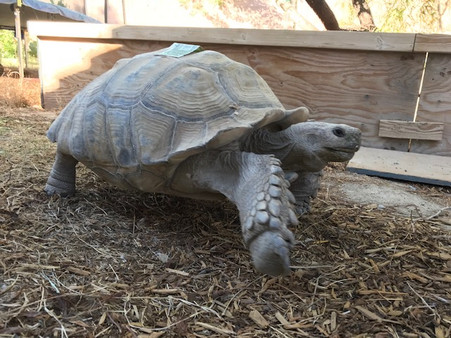- Home
- Tortoises For Sale
- Sulcata Tortoises For Sale
- Sulcata Tortoise (young adult male - pickup only)
- Home
- Tortoises For Sale
- Pet Tortoises For Sale - 4" Size or Larger
- Sulcata Tortoise (young adult male - pickup only)
Sulcata Tortoise (young adult male - pickup only)
Out of Stock
Product Reviews
Description
Common Name: Sulcata or "Spur-Thigh" Tortoise
Scientific Name: Geochelone Sulcata
Current Size: (various sizes)
Average Adult Size: 18-32" range depending on animal
Area of Origin: North/Central Africa
Description: Sandy beige color almost throughout their body, head and legs. Some will develop a darker "honey" color. Aggressive spikes on their front legs help them to dig and prevent being pulled out of their burrows backwards (which is nearly impossible to do). The "spurs" on their rear thighs between the tail and legs give them their "spur-thigh tortoise" name.
Habitat: Hot, dry climates. They can handle variable amounts of humidity in captivity, but naturally are from lower humidity areas. They do not hibernate, but will go through a winter slow down period during cooler weather and shortened daylengths. As adults, they can safely handle body temperatures as low as 45 degrees at night as long as they are able to heat up into the 70's during the day. Summer highs up to 120 degrees can be tolerated as long as there is a cooler, shaded retreat the tortoise can get into. Dampness is not a problem in high temperatures (a cool mud hole on a hot day), but in cooler weather the tortoises should be kept dry. As babies, these tortoises spend almost all their time in washes and underground in burrows, giving them a much more humid and moist environment than you picture the Sahara desert to be.
Diet: This tortoise is naturally a grazer, and will wander about nibbling on grass the majority of its natural life. In captivity, sulcata tortoises will graze on grasses as well as leafy weeds and clover (dandelions are a favorite). As babies, we focus more on feeding them a wide mix of leafy greens (spring mix), since they have a harder time eating the more tough grass. Vegetables can be added to the diet for variety, but a focus should be on leafy greens and grasses. Fruit should generally be avoided.
Adult Behavior: Adult sulcata tortoises are interactive and curious tortoises. They can be aggressive towards eachother, particularly when two similar-sized adult males are housed together. Over time (and with careful watching by the owner), they usually develop a hierarchy and smaller males will assume a submissive role. Sulcatas are not aggressive towards people. They can be damaging to their environment, digging deep burrows to stay warm or cool if no shelter is provided. Most sulcatas will eagerly come to their keepers looking for food once they are comfortable in their environments. They can get impatient in small areas, so this is not a tortoise for the keeper looking for something that doesn't need space. When an enclosure is properly built for the tortoise, they are very enjoyable animals to keep.
For more detailed information, Click Here to see the article we prepared for Reptiles Magazine.
 Loading... Please wait...
Loading... Please wait...

